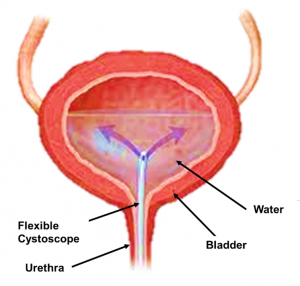Neurodiversity information for parents and young people
About a flexible cystoscopy
A flexible cystoscopy is an inspection of the bladder and urethra (the tube that carries urine out of the body). It is done with a narrow bendy telescope.
We do this to identify any abnormalities or problems. At the same time, we may:
- take a biopsy (small sample) of the bladder
- administer Botox injections to relax the bladder (this is a treatment for an overactive bladder or urge incontinence).
Flexible cystoscopy is an outpatient procedure. You will stay awake whilst it is carried out.
In a small number of cases, we may need to stretch your urethra to enable the telescope to be passed through.

Benefits
A cystoscopy helps us to find out if there are any problems or abnormalities in your bladder or urethra, or to treat symptoms of an overactive bladder. Without it, we would rely on observation and discussion about your symptoms.
Alternatives
An alternative to flexible cystoscopy is a rigid cystoscopy. This is a similar procedure but carried out under a general anaesthetic.
Possible side effects
Common side effects (10 in 100 patients):
For a short period after the procedure, mild burning or bleeding when passing urine.
Less common (1 to 2 in 100 patients):
A urinary infection requiring treatment with antibiotics.
Rare (less often than 2 in 100 patients):
- Continued bleeding after the procedure, or bleeding starts after internal scabs fall off (if biopsies have been taken). If this occurs, we may need to remove clots from the bladder or carry out a further procedure to stop the bleeding.
- Injury to the urethra itself. This can lead to scar tissue which may need additional treatment in the future.
- If bleeding is heavy or you cannot pass urine, we may need to insert a temporary urinary catheter (a tube passed up the urethra and into the bladder) to drain urine and blood.
Having a cystoscopy
What to do before
![]()
![]()
![]()
What it involves
- The clinician carrying out the procedure will review your symptoms to confirm that you still need the cystoscopy.
- You will be asked to sign a consent form and will have time to ask any questions.
- You will be taken to a private area where you will be asked to provide a urine sample (to rule out possible infection).
- You will then go to a procedure room and be assisted onto the examination couch.
- The area around your urethra will be cleaned and a local anaesthetic gel applied to reduce any discomfort.
- Once you are comfortable, a clinician will pass a bendy telescope into your urethra and up into your bladder. You will be able to see the inside of your bladder on the screen, if you wish.
- Sterile water may be pumped into your bladder so your doctor or nurse can see inside it more clearly.
- If you are having Botox injections or need a biopsy, small devices can be passed down the telescope.
- You may feel a desire to pass urine, but it should not be painful. If you do experience pain, tell your clinician. The cystoscopy can be stopped at any point.
- The procedure itself lasts approximately 10 to 15 minutes. However, the total time may be up to 45 minutes.
Afterwards
- You will be allowed home straight away.
- You may prefer not to drive after the procedure, especially if you have had Botox injections.
- You may pass some slightly bloodstained urine at first and this may sting a little.
- Over the next 24 hours, try to drink plenty of non-alcoholic fluids to flush your urinary system. We suggest 2 to 3 litres (or 4 to 6 pints).
- You may also be given a short course of antibiotics.
Recovery
You can get back to your normal activities, including driving, when you feel ready and after any discomfort has passed.
What to look out for
![]()
![]()
Further appointments or treatments
Before you leave hospital (after your cystoscopy), we will speak to you about any other treatments or procedures you may need.
More information
You can find our more information from:
- your GP
- your Urogynaecology Consultant when you see them next.
Contact information
Urogynaecology Team